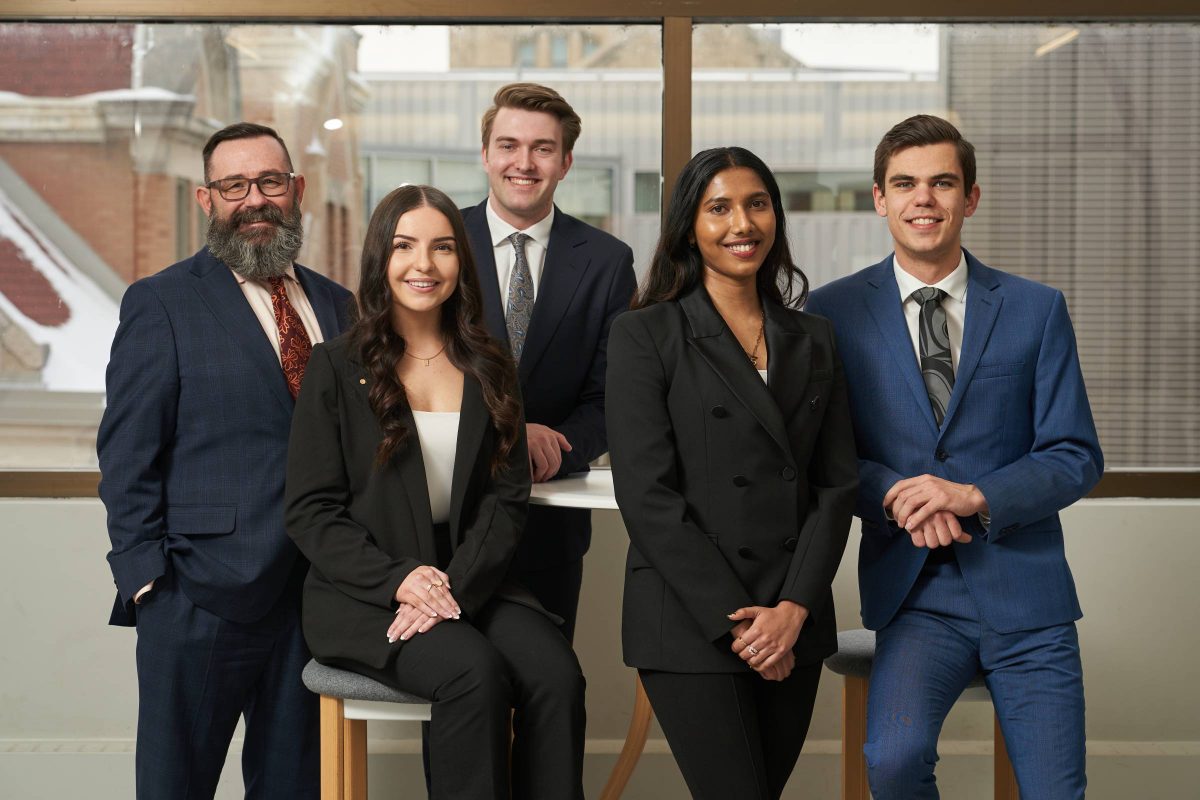
Asper Associate Dean Robert Biscontri with students Taylor Bially, Joshua Peterson, Sanjana Sabu and Tyler Roslinsky. Photo by David Lipnowski.
Asper undergraduate team wins first place in not-for-profit case competition and gives back
Winners share how they focused on creating value for long-term healthcare organization
Asper students Joshua Peterson, Tyler Roslinsky, Taylor Bially and Sanjana Sabu won first prize at the Alberta Not-for-Profit’s External Case Competition this February, bringing home a $1,500 cash prize, for which they already had big plans.
“We donated the prize back to CanU Canada, which does a lot of amazing work with high school students. They were also a great partner in helping us prepare for this competition, volunteering their time to create a practice case for us.”
CanU Canada representatives actually brought the team’s practice case to executives, giving students valuable feedback on their presentation.
The generosity at the heart of CanU’s practice participation and the students’ winning gesture is fitting given the focus of the competition that Peterson, Roslinsky, Bially and Sabu won.
Alberta Not-for-Profit’s competition is the only live, not-for-profit (NFP) business case competition in Canada. The team worked on a case about the CapitalCare Foundation, an organization that supports long-term care initiatives in Alberta. Together, they tackled funding, operational and awareness challenges, competing against teams from across North America.
Roslinsky, an Asper student majoring in finance and HR management, reflects on the team’s success.
“As a team, we were realistic about what was possible, which is very important when looking at an NFP. We have to approach these problems differently than a for-profit business, but at the end of the day, an NFP still needs enough resources and revenue to sustain itself. Successful and great NFPs focus on doing one thing or a small number of things very well rather than trying to do everything just okay.”
Bially, who is majoring in marketing and management information systems at Asper, adds that NFPs require a unique approach.
“Our coaches and mentors really helped us to adjust our mindset, encouraging us to focus less on making money and more on creating value.”
Roslinsky and Bially learned throughout the competition that NFPs must balance practicality with idealism—a change- or issue-driven organization might not need to maximize profit, but it does need to consider how to generate enough revenue, resources and connections to keep its doors open.
Discussing their reasons for joining case at Asper, Roslinsky and Bially strike a similar balance; both acknowledge that case looks great on a resume, but also that it offers amazing opportunities to work on real-world business problems, sharpen collaborative skills, improve confidence in public speaking and meet fellow students from across Canada and beyond.
Roslinsky, Bially, Peterson and Sabu were supported by a team of Asper advisors including Howard Harmatz, Robert Biscontri, Judy Jayasuriya, Melani Fernando, Laura Effinger and Steven Harrison.
“They helped us see things through a different lens, thinking more about what NFPs need rather than treating them like traditional businesses,” says Bially. She also comments on their ability to home in on seemingly minor details that made a big difference. Roslinsky echoes this praise.
“Once we had the overarching structure down, they helped us to really get into those fine, granular bits because those are the things that change a team from being good to being great.”
The little things, it turns out, matter. Both students share how a surprise delivery while they toiled away on their case presentation might not have won the competition for them, but certainly left an impression.
Biscontri, Asper associate dean of undergraduate and international programs, took some dessert to-go (“one of everything,” he explains) while out to dinner with rest of the advising team. Barred from any contact with the students while they developed their solution, he delivered the pile of cakes and other goodies by way of the hotel front desk, leaving nothing—not even a note—to explain the gesture.
There is a practicality to case competitions—they prepare students for the real business problems they will face in their careers, they introduce students to invaluable networks of advisors, industry judges and colleagues and they help refine core skills from public speaking to problem solving.
That said, whether it be a local organization giving their time to help students practice, those same students donating their winnings back to the organization or a surprise dessert delivery left without a note, there is also something more to case—an experience unique to each team and competition, summed up in part by Biscontri’s accidental advice to the team:
“We can go for dinner after, but let’s get dessert first.”






